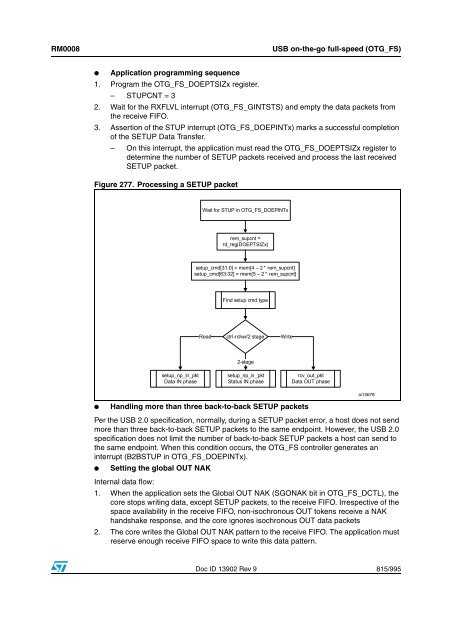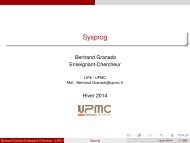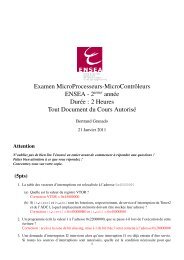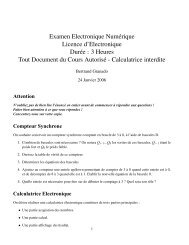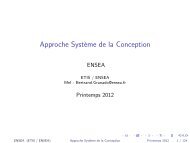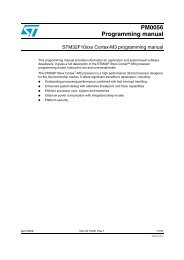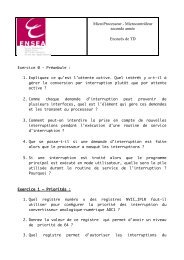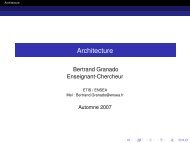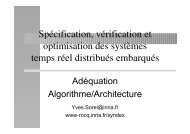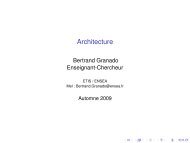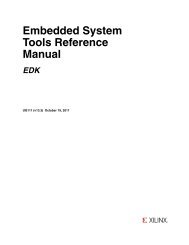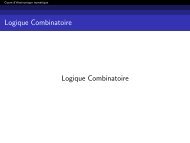- Page 1 and 2:
RM0008 Reference manual STM32F101xx
- Page 3 and 4:
RM0008 Contents 4.3.1 Slowing down
- Page 5 and 6:
RM0008 Contents 7.3.4 APB2 peripher
- Page 7 and 8:
RM0008 Contents 10.1 DMA introducti
- Page 9 and 10:
RM0008 Contents 12.3.2 DAC output b
- Page 11 and 12:
RM0008 Contents 13.4.6 TIM1&TIM8 ev
- Page 13 and 14:
RM0008 Contents 15.4.8 TIM6&TIM7 au
- Page 15 and 16:
RM0008 Contents 20 Secure digital i
- Page 17 and 18:
RM0008 Contents 21.5.2 Endpoint-spe
- Page 19 and 20:
RM0008 Contents 23.5.10 SPI registe
- Page 21 and 22:
RM0008 Contents 26.5 USB peripheral
- Page 23 and 24:
RM0008 Contents 27.7 Ethernet inter
- Page 25 and 26:
RM0008 List of tables List of table
- Page 27 and 28:
RM0008 List of tables Table 100. FS
- Page 29 and 30:
RM0008 List of tables Table 202. Pa
- Page 31 and 32:
RM0008 List of figures Figure 49. D
- Page 33 and 34:
RM0008 List of figures preloaded).
- Page 35 and 36:
RM0008 List of figures Figure 255.
- Page 37 and 38:
RM0008 Documentation conventions 1
- Page 39 and 40:
RM0008 Memory and bus architecture
- Page 41 and 42:
RM0008 Memory and bus architecture
- Page 43 and 44:
RM0008 Memory and bus architecture
- Page 45 and 46:
RM0008 Memory and bus architecture
- Page 47 and 48:
RM0008 Memory and bus architecture
- Page 49 and 50:
RM0008 Memory and bus architecture
- Page 51 and 52:
RM0008 CRC calculation unit 3.3 CRC
- Page 53 and 54:
RM0008 Power control (PWR) 4 Power
- Page 55 and 56:
RM0008 Power control (PWR) Note: Du
- Page 57 and 58:
RM0008 Power control (PWR) 4.3 Low-
- Page 59 and 60:
RM0008 Power control (PWR) Table 9.
- Page 61 and 62:
RM0008 Power control (PWR) switched
- Page 63 and 64:
RM0008 Power control (PWR) Bit 8 DB
- Page 65 and 66:
RM0008 Power control (PWR) 4.4.3 PW
- Page 67 and 68:
RM0008 Backup registers (BKP) 5.3 B
- Page 69 and 70:
RM0008 Backup registers (BKP) Bit 6
- Page 71 and 72:
RM0008 Backup registers (BKP) Table
- Page 73 and 74:
RM0008 Backup registers (BKP) Table
- Page 75 and 76:
RM0008 Low-, medium- and high-densi
- Page 77 and 78:
RM0008 Low-, medium- and high-densi
- Page 79 and 80:
RM0008 Low-, medium- and high-densi
- Page 81 and 82:
RM0008 Low-, medium- and high-densi
- Page 83 and 84:
RM0008 Low-, medium- and high-densi
- Page 85 and 86:
RM0008 Low-, medium- and high-densi
- Page 87 and 88:
RM0008 Low-, medium- and high-densi
- Page 89 and 90:
RM0008 Low-, medium- and high-densi
- Page 91 and 92:
RM0008 Low-, medium- and high-densi
- Page 93 and 94:
RM0008 Low-, medium- and high-densi
- Page 95 and 96:
RM0008 Low-, medium- and high-densi
- Page 97 and 98:
RM0008 Low-, medium- and high-densi
- Page 99 and 100:
RM0008 Low-, medium- and high-densi
- Page 101 and 102:
RM0008 Low-, medium- and high-densi
- Page 103 and 104:
RM0008 Low-, medium- and high-densi
- Page 105 and 106:
RM0008 Connectivity line devices: r
- Page 107 and 108:
RM0008 Connectivity line devices: r
- Page 109 and 110:
RM0008 Connectivity line devices: r
- Page 111 and 112:
RM0008 Connectivity line devices: r
- Page 113 and 114:
RM0008 Connectivity line devices: r
- Page 115 and 116:
RM0008 Connectivity line devices: r
- Page 117 and 118:
RM0008 Connectivity line devices: r
- Page 119 and 120:
RM0008 Connectivity line devices: r
- Page 121 and 122:
RM0008 Connectivity line devices: r
- Page 123 and 124:
RM0008 Connectivity line devices: r
- Page 125 and 126:
RM0008 Connectivity line devices: r
- Page 127 and 128:
RM0008 Connectivity line devices: r
- Page 129 and 130:
RM0008 Connectivity line devices: r
- Page 131 and 132:
RM0008 Connectivity line devices: r
- Page 133 and 134:
RM0008 Connectivity line devices: r
- Page 135 and 136:
RM0008 Connectivity line devices: r
- Page 137 and 138:
RM0008 Connectivity line devices: r
- Page 139 and 140:
RM0008 General-purpose and alternat
- Page 141 and 142:
RM0008 General-purpose and alternat
- Page 143 and 144:
RM0008 General-purpose and alternat
- Page 145 and 146:
RM0008 General-purpose and alternat
- Page 147 and 148:
RM0008 General-purpose and alternat
- Page 149 and 150:
RM0008 General-purpose and alternat
- Page 151 and 152:
RM0008 General-purpose and alternat
- Page 153 and 154:
RM0008 General-purpose and alternat
- Page 155 and 156:
RM0008 General-purpose and alternat
- Page 157 and 158:
RM0008 General-purpose and alternat
- Page 159 and 160:
RM0008 General-purpose and alternat
- Page 161 and 162:
RM0008 General-purpose and alternat
- Page 163 and 164:
RM0008 General-purpose and alternat
- Page 165 and 166:
RM0008 General-purpose and alternat
- Page 167 and 168:
RM0008 General-purpose and alternat
- Page 169 and 170:
RM0008 Interrupts and events 9 Inte
- Page 171 and 172:
RM0008 Interrupts and events Table
- Page 173 and 174:
RM0008 Interrupts and events Table
- Page 175 and 176:
. RM0008 Interrupts and events 9.2.
- Page 177 and 178:
RM0008 Interrupts and events Figure
- Page 179 and 180:
RM0008 Interrupts and events 9.3.3
- Page 181 and 182:
RM0008 Interrupts and events 9.3.7
- Page 183 and 184:
RM0008 DMA controller (DMA) Figure
- Page 185 and 186:
RM0008 DMA controller (DMA) transfe
- Page 187 and 188:
RM0008 DMA controller (DMA) not sup
- Page 189 and 190:
RM0008 DMA controller (DMA) Table 5
- Page 191 and 192:
RM0008 DMA controller (DMA) 10.4 DM
- Page 193 and 194:
RM0008 DMA controller (DMA) 10.4.3
- Page 195 and 196:
RM0008 DMA controller (DMA) 10.4.5
- Page 197 and 198:
RM0008 DMA controller (DMA) Table 5
- Page 199 and 200:
RM0008 Analog-to-digital converter
- Page 201 and 202:
RM0008 Analog-to-digital converter
- Page 203 and 204:
RM0008 Analog-to-digital converter
- Page 205 and 206:
RM0008 Analog-to-digital converter
- Page 207 and 208:
RM0008 Analog-to-digital converter
- Page 209 and 210:
RM0008 Analog-to-digital converter
- Page 211 and 212:
RM0008 Analog-to-digital converter
- Page 213 and 214:
RM0008 Analog-to-digital converter
- Page 215 and 216:
RM0008 Analog-to-digital converter
- Page 217 and 218:
RM0008 Analog-to-digital converter
- Page 219 and 220:
RM0008 Analog-to-digital converter
- Page 221 and 222:
RM0008 Analog-to-digital converter
- Page 223 and 224:
RM0008 Analog-to-digital converter
- Page 225 and 226:
RM0008 Analog-to-digital converter
- Page 227 and 228:
RM0008 Analog-to-digital converter
- Page 229 and 230:
RM0008 Analog-to-digital converter
- Page 231 and 232:
RM0008 Analog-to-digital converter
- Page 233 and 234:
RM0008 Digital-to-analog converter
- Page 235 and 236:
RM0008 Digital-to-analog converter
- Page 237 and 238:
RM0008 Digital-to-analog converter
- Page 239 and 240:
RM0008 Digital-to-analog converter
- Page 241 and 242:
RM0008 Digital-to-analog converter
- Page 243 and 244:
RM0008 Digital-to-analog converter
- Page 245 and 246:
RM0008 Digital-to-analog converter
- Page 247 and 248:
RM0008 Digital-to-analog converter
- Page 249 and 250:
RM0008 Digital-to-analog converter
- Page 251 and 252:
RM0008 Digital-to-analog converter
- Page 253 and 254:
RM0008 Advanced-control timers (TIM
- Page 255 and 256:
RM0008 Advanced-control timers (TIM
- Page 257 and 258:
RM0008 Advanced-control timers (TIM
- Page 259 and 260:
RM0008 Advanced-control timers (TIM
- Page 261 and 262:
RM0008 Advanced-control timers (TIM
- Page 263 and 264:
RM0008 Advanced-control timers (TIM
- Page 265 and 266:
RM0008 Advanced-control timers (TIM
- Page 267 and 268:
RM0008 Advanced-control timers (TIM
- Page 269 and 270:
RM0008 Advanced-control timers (TIM
- Page 271 and 272:
RM0008 Advanced-control timers (TIM
- Page 273 and 274:
RM0008 Advanced-control timers (TIM
- Page 275 and 276:
RM0008 Advanced-control timers (TIM
- Page 277 and 278:
RM0008 Advanced-control timers (TIM
- Page 279 and 280:
RM0008 Advanced-control timers (TIM
- Page 281 and 282:
RM0008 Advanced-control timers (TIM
- Page 283 and 284:
RM0008 Advanced-control timers (TIM
- Page 285 and 286:
RM0008 Advanced-control timers (TIM
- Page 287 and 288:
RM0008 Advanced-control timers (TIM
- Page 289 and 290:
RM0008 Advanced-control timers (TIM
- Page 291 and 292:
RM0008 Advanced-control timers (TIM
- Page 293 and 294:
RM0008 Advanced-control timers (TIM
- Page 295 and 296:
RM0008 Advanced-control timers (TIM
- Page 297 and 298:
RM0008 Advanced-control timers (TIM
- Page 299 and 300:
RM0008 Advanced-control timers (TIM
- Page 301 and 302:
RM0008 Advanced-control timers (TIM
- Page 303 and 304:
RM0008 Advanced-control timers (TIM
- Page 305 and 306:
RM0008 Advanced-control timers (TIM
- Page 307 and 308:
RM0008 Advanced-control timers (TIM
- Page 309 and 310:
RM0008 Advanced-control timers (TIM
- Page 311 and 312:
RM0008 Advanced-control timers (TIM
- Page 313 and 314:
RM0008 Advanced-control timers (TIM
- Page 315 and 316:
RM0008 Advanced-control timers (TIM
- Page 317 and 318:
RM0008 Advanced-control timers (TIM
- Page 319 and 320:
RM0008 General-purpose timer (TIMx)
- Page 321 and 322:
RM0008 General-purpose timer (TIMx)
- Page 323 and 324:
RM0008 General-purpose timer (TIMx)
- Page 325 and 326:
RM0008 General-purpose timer (TIMx)
- Page 327 and 328:
RM0008 General-purpose timer (TIMx)
- Page 329 and 330:
RM0008 General-purpose timer (TIMx)
- Page 331 and 332:
RM0008 General-purpose timer (TIMx)
- Page 333 and 334:
RM0008 General-purpose timer (TIMx)
- Page 335 and 336:
RM0008 General-purpose timer (TIMx)
- Page 337 and 338:
RM0008 General-purpose timer (TIMx)
- Page 339 and 340:
RM0008 General-purpose timer (TIMx)
- Page 341 and 342:
RM0008 General-purpose timer (TIMx)
- Page 343 and 344:
RM0008 General-purpose timer (TIMx)
- Page 345 and 346:
RM0008 General-purpose timer (TIMx)
- Page 347 and 348:
RM0008 General-purpose timer (TIMx)
- Page 349 and 350:
RM0008 General-purpose timer (TIMx)
- Page 351 and 352:
RM0008 General-purpose timer (TIMx)
- Page 353 and 354:
RM0008 General-purpose timer (TIMx)
- Page 355 and 356:
RM0008 General-purpose timer (TIMx)
- Page 357 and 358:
RM0008 General-purpose timer (TIMx)
- Page 359 and 360:
RM0008 General-purpose timer (TIMx)
- Page 361 and 362:
RM0008 General-purpose timer (TIMx)
- Page 363 and 364:
RM0008 General-purpose timer (TIMx)
- Page 365 and 366:
RM0008 General-purpose timer (TIMx)
- Page 367 and 368:
RM0008 General-purpose timer (TIMx)
- Page 369 and 370:
RM0008 General-purpose timer (TIMx)
- Page 371 and 372:
RM0008 General-purpose timer (TIMx)
- Page 373 and 374:
RM0008 General-purpose timer (TIMx)
- Page 375 and 376:
RM0008 Basic timers (TIM6&TIM7) 15
- Page 377 and 378:
RM0008 Basic timers (TIM6&TIM7) Pre
- Page 379 and 380:
RM0008 Basic timers (TIM6&TIM7) Fig
- Page 381 and 382:
RM0008 Basic timers (TIM6&TIM7) Fig
- Page 383 and 384:
RM0008 Basic timers (TIM6&TIM7) 15.
- Page 385 and 386:
RM0008 Basic timers (TIM6&TIM7) 15.
- Page 387 and 388:
RM0008 Real-time clock (RTC) 16 Rea
- Page 389 and 390:
RM0008 Real-time clock (RTC) Figure
- Page 391 and 392:
RM0008 Real-time clock (RTC) 16.3.5
- Page 393 and 394:
RM0008 Real-time clock (RTC) 16.4.2
- Page 395 and 396:
RM0008 Real-time clock (RTC) RTC pr
- Page 397 and 398:
RM0008 Real-time clock (RTC) 16.4.6
- Page 399 and 400:
RM0008 Independent watchdog (IWDG)
- Page 401 and 402:
RM0008 Independent watchdog (IWDG)
- Page 403 and 404:
RM0008 Independent watchdog (IWDG)
- Page 405 and 406:
RM0008 Window watchdog (WWDG) Figur
- Page 407 and 408:
RM0008 Window watchdog (WWDG) 18.6
- Page 409 and 410:
RM0008 Flexible static memory contr
- Page 411 and 412:
RM0008 Flexible static memory contr
- Page 413 and 414:
RM0008 Flexible static memory contr
- Page 415 and 416:
RM0008 Flexible static memory contr
- Page 417 and 418:
RM0008 Flexible static memory contr
- Page 419 and 420:
RM0008 Flexible static memory contr
- Page 421 and 422:
RM0008 Flexible static memory contr
- Page 423 and 424:
RM0008 Flexible static memory contr
- Page 425 and 426:
RM0008 Flexible static memory contr
- Page 427 and 428:
RM0008 Flexible static memory contr
- Page 429 and 430:
RM0008 Flexible static memory contr
- Page 431 and 432:
RM0008 Flexible static memory contr
- Page 433 and 434:
RM0008 Flexible static memory contr
- Page 435 and 436:
RM0008 Flexible static memory contr
- Page 437 and 438:
RM0008 Flexible static memory contr
- Page 439 and 440:
RM0008 Flexible static memory contr
- Page 441 and 442:
RM0008 Flexible static memory contr
- Page 443 and 444:
RM0008 Flexible static memory contr
- Page 445 and 446:
RM0008 Flexible static memory contr
- Page 447 and 448:
RM0008 Flexible static memory contr
- Page 449 and 450:
RM0008 Flexible static memory contr
- Page 451 and 452:
RM0008 Flexible static memory contr
- Page 453 and 454:
RM0008 Flexible static memory contr
- Page 455 and 456:
RM0008 Flexible static memory contr
- Page 457 and 458:
RM0008 Secure digital input/output
- Page 459 and 460:
RM0008 Secure digital input/output
- Page 461 and 462:
RM0008 Secure digital input/output
- Page 463 and 464:
RM0008 Secure digital input/output
- Page 465 and 466:
RM0008 Secure digital input/output
- Page 467 and 468:
RM0008 Secure digital input/output
- Page 469 and 470:
RM0008 Secure digital input/output
- Page 471 and 472:
RM0008 Secure digital input/output
- Page 473 and 474:
RM0008 Secure digital input/output
- Page 475 and 476:
RM0008 Secure digital input/output
- Page 477 and 478:
RM0008 Secure digital input/output
- Page 479 and 480:
RM0008 Secure digital input/output
- Page 481 and 482:
RM0008 Secure digital input/output
- Page 483 and 484:
RM0008 Secure digital input/output
- Page 485 and 486:
RM0008 Secure digital input/output
- Page 487 and 488:
RM0008 Secure digital input/output
- Page 489 and 490:
RM0008 Secure digital input/output
- Page 491 and 492:
RM0008 Secure digital input/output
- Page 493 and 494:
RM0008 Secure digital input/output
- Page 495 and 496:
RM0008 Secure digital input/output
- Page 497 and 498:
RM0008 Secure digital input/output
- Page 499 and 500:
RM0008 Secure digital input/output
- Page 501 and 502:
RM0008 Secure digital input/output
- Page 503 and 504:
RM0008 Secure digital input/output
- Page 505 and 506:
RM0008 Secure digital input/output
- Page 507 and 508:
RM0008 Secure digital input/output
- Page 509 and 510:
RM0008 Secure digital input/output
- Page 511 and 512:
RM0008 Secure digital input/output
- Page 513 and 514:
RM0008 Universal serial bus full-sp
- Page 515 and 516:
RM0008 Universal serial bus full-sp
- Page 517 and 518:
RM0008 Universal serial bus full-sp
- Page 519 and 520:
RM0008 Universal serial bus full-sp
- Page 521 and 522:
RM0008 Universal serial bus full-sp
- Page 523 and 524:
RM0008 Universal serial bus full-sp
- Page 525 and 526:
RM0008 Universal serial bus full-sp
- Page 527 and 528:
RM0008 Universal serial bus full-sp
- Page 529 and 530:
RM0008 Universal serial bus full-sp
- Page 531 and 532:
RM0008 Universal serial bus full-sp
- Page 533 and 534:
RM0008 Universal serial bus full-sp
- Page 535 and 536:
RM0008 Universal serial bus full-sp
- Page 537 and 538:
RM0008 Universal serial bus full-sp
- Page 539 and 540:
RM0008 Universal serial bus full-sp
- Page 541 and 542:
RM0008 Universal serial bus full-sp
- Page 543 and 544:
RM0008 Controller area network (bxC
- Page 545 and 546:
RM0008 Controller area network (bxC
- Page 547 and 548:
RM0008 Controller area network (bxC
- Page 549 and 550:
RM0008 Controller area network (bxC
- Page 551 and 552:
RM0008 Controller area network (bxC
- Page 553 and 554:
RM0008 Controller area network (bxC
- Page 555 and 556:
RM0008 Controller area network (bxC
- Page 557 and 558:
RM0008 Controller area network (bxC
- Page 559 and 560:
RM0008 Controller area network (bxC
- Page 561 and 562:
RM0008 Controller area network (bxC
- Page 563 and 564:
RM0008 Controller area network (bxC
- Page 565 and 566:
RM0008 Controller area network (bxC
- Page 567 and 568:
RM0008 Controller area network (bxC
- Page 569 and 570:
RM0008 Controller area network (bxC
- Page 571 and 572:
RM0008 Controller area network (bxC
- Page 573 and 574:
RM0008 Controller area network (bxC
- Page 575 and 576:
RM0008 Controller area network (bxC
- Page 577 and 578:
RM0008 Controller area network (bxC
- Page 579 and 580:
RM0008 Controller area network (bxC
- Page 581 and 582:
RM0008 Controller area network (bxC
- Page 583 and 584:
RM0008 Controller area network (bxC
- Page 585 and 586:
RM0008 Controller area network (bxC
- Page 587 and 588:
RM0008 Serial peripheral interface
- Page 589 and 590:
RM0008 Serial peripheral interface
- Page 591 and 592:
RM0008 Serial peripheral interface
- Page 593 and 594:
RM0008 Serial peripheral interface
- Page 595 and 596:
RM0008 Serial peripheral interface
- Page 597 and 598:
RM0008 Serial peripheral interface
- Page 599 and 600:
RM0008 Serial peripheral interface
- Page 601 and 602:
RM0008 Serial peripheral interface
- Page 603 and 604:
RM0008 Serial peripheral interface
- Page 605 and 606:
RM0008 Serial peripheral interface
- Page 607 and 608:
RM0008 Serial peripheral interface
- Page 609 and 610:
RM0008 Serial peripheral interface
- Page 611 and 612:
RM0008 Serial peripheral interface
- Page 613 and 614:
RM0008 Serial peripheral interface
- Page 615 and 616:
RM0008 Serial peripheral interface
- Page 617 and 618:
RM0008 Serial peripheral interface
- Page 619 and 620:
RM0008 Serial peripheral interface
- Page 621 and 622:
RM0008 Serial peripheral interface
- Page 623 and 624:
RM0008 Serial peripheral interface
- Page 625 and 626:
RM0008 Inter-integrated circuit (I
- Page 627 and 628:
RM0008 Inter-integrated circuit (I
- Page 629 and 630:
RM0008 Inter-integrated circuit (I
- Page 631 and 632:
RM0008 Inter-integrated circuit (I
- Page 633 and 634:
RM0008 Inter-integrated circuit (I
- Page 635 and 636:
RM0008 Inter-integrated circuit (I
- Page 637 and 638:
RM0008 Inter-integrated circuit (I
- Page 639 and 640:
RM0008 Inter-integrated circuit (I
- Page 641 and 642:
RM0008 Inter-integrated circuit (I
- Page 643 and 644:
RM0008 Inter-integrated circuit (I
- Page 645 and 646:
RM0008 Inter-integrated circuit (I
- Page 647 and 648:
RM0008 Inter-integrated circuit (I
- Page 649 and 650:
RM0008 Inter-integrated circuit (I
- Page 651 and 652:
RM0008 Inter-integrated circuit (I
- Page 653 and 654:
RM0008 Universal synchronous asynch
- Page 655 and 656:
RM0008 Universal synchronous asynch
- Page 657 and 658:
RM0008 Universal synchronous asynch
- Page 659 and 660:
RM0008 Universal synchronous asynch
- Page 661 and 662:
RM0008 Universal synchronous asynch
- Page 663 and 664:
RM0008 Universal synchronous asynch
- Page 665 and 666:
RM0008 Universal synchronous asynch
- Page 667 and 668:
RM0008 Universal synchronous asynch
- Page 669 and 670:
RM0008 Universal synchronous asynch
- Page 671 and 672:
RM0008 Universal synchronous asynch
- Page 673 and 674:
RM0008 Universal synchronous asynch
- Page 675 and 676:
RM0008 Universal synchronous asynch
- Page 677 and 678:
RM0008 Universal synchronous asynch
- Page 679 and 680:
RM0008 Universal synchronous asynch
- Page 681 and 682:
RM0008 Universal synchronous asynch
- Page 683 and 684:
RM0008 Universal synchronous asynch
- Page 685 and 686:
RM0008 Universal synchronous asynch
- Page 687 and 688:
RM0008 Universal synchronous asynch
- Page 689 and 690:
RM0008 Universal synchronous asynch
- Page 691 and 692:
RM0008 Universal synchronous asynch
- Page 693 and 694:
RM0008 Universal synchronous asynch
- Page 695 and 696:
RM0008 USB on-the-go full-speed (OT
- Page 697 and 698:
RM0008 USB on-the-go full-speed (OT
- Page 699 and 700:
RM0008 USB on-the-go full-speed (OT
- Page 701 and 702:
RM0008 USB on-the-go full-speed (OT
- Page 703 and 704:
RM0008 USB on-the-go full-speed (OT
- Page 705 and 706:
RM0008 USB on-the-go full-speed (OT
- Page 707 and 708:
RM0008 USB on-the-go full-speed (OT
- Page 709 and 710:
RM0008 USB on-the-go full-speed (OT
- Page 711 and 712:
RM0008 USB on-the-go full-speed (OT
- Page 713 and 714:
RM0008 USB on-the-go full-speed (OT
- Page 715 and 716:
RM0008 USB on-the-go full-speed (OT
- Page 717 and 718:
RM0008 USB on-the-go full-speed (OT
- Page 719 and 720:
RM0008 USB on-the-go full-speed (OT
- Page 721 and 722:
RM0008 USB on-the-go full-speed (OT
- Page 723 and 724:
RM0008 USB on-the-go full-speed (OT
- Page 725 and 726:
RM0008 USB on-the-go full-speed (OT
- Page 727 and 728:
RM0008 USB on-the-go full-speed (OT
- Page 729 and 730:
RM0008 USB on-the-go full-speed (OT
- Page 731 and 732:
RM0008 USB on-the-go full-speed (OT
- Page 733 and 734:
RM0008 USB on-the-go full-speed (OT
- Page 735 and 736:
RM0008 USB on-the-go full-speed (OT
- Page 737 and 738:
RM0008 USB on-the-go full-speed (OT
- Page 739 and 740:
RM0008 USB on-the-go full-speed (OT
- Page 741 and 742:
RM0008 USB on-the-go full-speed (OT
- Page 743 and 744:
RM0008 USB on-the-go full-speed (OT
- Page 745 and 746:
RM0008 USB on-the-go full-speed (OT
- Page 747 and 748:
RM0008 USB on-the-go full-speed (OT
- Page 749 and 750:
RM0008 USB on-the-go full-speed (OT
- Page 751 and 752:
RM0008 USB on-the-go full-speed (OT
- Page 753 and 754:
RM0008 USB on-the-go full-speed (OT
- Page 755 and 756:
RM0008 USB on-the-go full-speed (OT
- Page 757 and 758:
RM0008 USB on-the-go full-speed (OT
- Page 759 and 760:
RM0008 USB on-the-go full-speed (OT
- Page 761 and 762:
RM0008 USB on-the-go full-speed (OT
- Page 763 and 764: RM0008 USB on-the-go full-speed (OT
- Page 765 and 766: RM0008 USB on-the-go full-speed (OT
- Page 767 and 768: RM0008 USB on-the-go full-speed (OT
- Page 769 and 770: RM0008 USB on-the-go full-speed (OT
- Page 771 and 772: RM0008 USB on-the-go full-speed (OT
- Page 773 and 774: RM0008 USB on-the-go full-speed (OT
- Page 775 and 776: RM0008 USB on-the-go full-speed (OT
- Page 777 and 778: RM0008 USB on-the-go full-speed (OT
- Page 779 and 780: RM0008 USB on-the-go full-speed (OT
- Page 781 and 782: RM0008 USB on-the-go full-speed (OT
- Page 783 and 784: RM0008 USB on-the-go full-speed (OT
- Page 785 and 786: RM0008 USB on-the-go full-speed (OT
- Page 787 and 788: RM0008 USB on-the-go full-speed (OT
- Page 789 and 790: RM0008 USB on-the-go full-speed (OT
- Page 791 and 792: RM0008 USB on-the-go full-speed (OT
- Page 793 and 794: RM0008 USB on-the-go full-speed (OT
- Page 795 and 796: RM0008 USB on-the-go full-speed (OT
- Page 797 and 798: RM0008 USB on-the-go full-speed (OT
- Page 799 and 800: RM0008 USB on-the-go full-speed (OT
- Page 801 and 802: RM0008 USB on-the-go full-speed (OT
- Page 803 and 804: RM0008 USB on-the-go full-speed (OT
- Page 805 and 806: RM0008 USB on-the-go full-speed (OT
- Page 807 and 808: RM0008 USB on-the-go full-speed (OT
- Page 809 and 810: RM0008 USB on-the-go full-speed (OT
- Page 811 and 812: RM0008 USB on-the-go full-speed (OT
- Page 813: RM0008 USB on-the-go full-speed (OT
- Page 817 and 818: RM0008 USB on-the-go full-speed (OT
- Page 819 and 820: RM0008 USB on-the-go full-speed (OT
- Page 821 and 822: RM0008 USB on-the-go full-speed (OT
- Page 823 and 824: RM0008 USB on-the-go full-speed (OT
- Page 825 and 826: RM0008 USB on-the-go full-speed (OT
- Page 827 and 828: RM0008 USB on-the-go full-speed (OT
- Page 829 and 830: RM0008 USB on-the-go full-speed (OT
- Page 831 and 832: RM0008 USB on-the-go full-speed (OT
- Page 833 and 834: RM0008 USB on-the-go full-speed (OT
- Page 835 and 836: RM0008 USB on-the-go full-speed (OT
- Page 837 and 838: RM0008 Ethernet (ETH): media access
- Page 839 and 840: RM0008 Ethernet (ETH): media access
- Page 841 and 842: RM0008 Ethernet (ETH): media access
- Page 843 and 844: RM0008 Ethernet (ETH): media access
- Page 845 and 846: RM0008 Ethernet (ETH): media access
- Page 847 and 848: RM0008 Ethernet (ETH): media access
- Page 849 and 850: RM0008 Ethernet (ETH): media access
- Page 851 and 852: RM0008 Ethernet (ETH): media access
- Page 853 and 854: RM0008 Ethernet (ETH): media access
- Page 855 and 856: RM0008 Ethernet (ETH): media access
- Page 857 and 858: RM0008 Ethernet (ETH): media access
- Page 859 and 860: RM0008 Ethernet (ETH): media access
- Page 861 and 862: RM0008 Ethernet (ETH): media access
- Page 863 and 864: RM0008 Ethernet (ETH): media access
- Page 865 and 866:
RM0008 Ethernet (ETH): media access
- Page 867 and 868:
RM0008 Ethernet (ETH): media access
- Page 869 and 870:
RM0008 Ethernet (ETH): media access
- Page 871 and 872:
RM0008 Ethernet (ETH): media access
- Page 873 and 874:
RM0008 Ethernet (ETH): media access
- Page 875 and 876:
RM0008 Ethernet (ETH): media access
- Page 877 and 878:
RM0008 Ethernet (ETH): media access
- Page 879 and 880:
RM0008 Ethernet (ETH): media access
- Page 881 and 882:
RM0008 Ethernet (ETH): media access
- Page 883 and 884:
RM0008 Ethernet (ETH): media access
- Page 885 and 886:
RM0008 Ethernet (ETH): media access
- Page 887 and 888:
RM0008 Ethernet (ETH): media access
- Page 889 and 890:
RM0008 Ethernet (ETH): media access
- Page 891 and 892:
RM0008 Ethernet (ETH): media access
- Page 893 and 894:
RM0008 Ethernet (ETH): media access
- Page 895 and 896:
RM0008 Ethernet (ETH): media access
- Page 897 and 898:
RM0008 Ethernet (ETH): media access
- Page 899 and 900:
RM0008 Ethernet (ETH): media access
- Page 901 and 902:
RM0008 Ethernet (ETH): media access
- Page 903 and 904:
RM0008 Ethernet (ETH): media access
- Page 905 and 906:
RM0008 Ethernet (ETH): media access
- Page 907 and 908:
RM0008 Ethernet (ETH): media access
- Page 909 and 910:
RM0008 Ethernet (ETH): media access
- Page 911 and 912:
RM0008 Ethernet (ETH): media access
- Page 913 and 914:
RM0008 Ethernet (ETH): media access
- Page 915 and 916:
RM0008 Ethernet (ETH): media access
- Page 917 and 918:
RM0008 Ethernet (ETH): media access
- Page 919 and 920:
RM0008 Ethernet (ETH): media access
- Page 921 and 922:
RM0008 Ethernet (ETH): media access
- Page 923 and 924:
RM0008 Ethernet (ETH): media access
- Page 925 and 926:
RM0008 Ethernet (ETH): media access
- Page 927 and 928:
RM0008 Ethernet (ETH): media access
- Page 929 and 930:
RM0008 Ethernet (ETH): media access
- Page 931 and 932:
RM0008 Ethernet (ETH): media access
- Page 933 and 934:
RM0008 Ethernet (ETH): media access
- Page 935 and 936:
RM0008 Ethernet (ETH): media access
- Page 937 and 938:
RM0008 Ethernet (ETH): media access
- Page 939 and 940:
RM0008 Ethernet (ETH): media access
- Page 941 and 942:
RM0008 Ethernet (ETH): media access
- Page 943 and 944:
RM0008 Ethernet (ETH): media access
- Page 945 and 946:
RM0008 Ethernet (ETH): media access
- Page 947 and 948:
RM0008 Ethernet (ETH): media access
- Page 949 and 950:
RM0008 Device electronic signature
- Page 951 and 952:
RM0008 Device electronic signature
- Page 953 and 954:
RM0008 Debug support (DBG) Figure 3
- Page 955 and 956:
RM0008 Debug support (DBG) JTAG-DP
- Page 957 and 958:
RM0008 Debug support (DBG) Note: On
- Page 959 and 960:
RM0008 Debug support (DBG) DBGMCU_I
- Page 961 and 962:
RM0008 Debug support (DBG) Table 20
- Page 963 and 964:
RM0008 Debug support (DBG) Table 20
- Page 965 and 966:
RM0008 Debug support (DBG) Table 20
- Page 967 and 968:
RM0008 Debug support (DBG) Note: Im
- Page 969 and 970:
RM0008 Debug support (DBG) Note: Fo
- Page 971 and 972:
RM0008 Debug support (DBG) Table 20
- Page 973 and 974:
RM0008 Debug support (DBG) Bits 31:
- Page 975 and 976:
RM0008 Debug support (DBG) Figure 3
- Page 977 and 978:
RM0008 Debug support (DBG) The debu
- Page 979 and 980:
RM0008 Debug support (DBG) 29.17.9
- Page 981 and 982:
RM0008 Revision history 30 Revision
- Page 983 and 984:
RM0008 Revision history Table 215.
- Page 985 and 986:
RM0008 Revision history Table 215.
- Page 987 and 988:
RM0008 Revision history Table 215.
- Page 989 and 990:
RM0008 Revision history Table 215.
- Page 991 and 992:
RM0008 Revision history Table 215.
- Page 993 and 994:
RM0008 Index ETH_MACMIIDR . . . . .
- Page 995:
RM0008 Please Read Carefully: Infor


